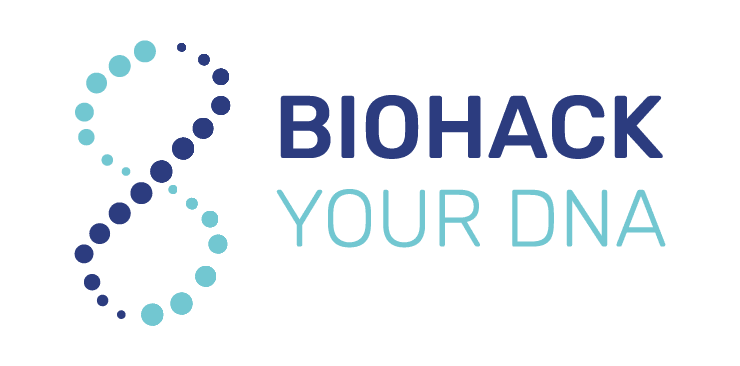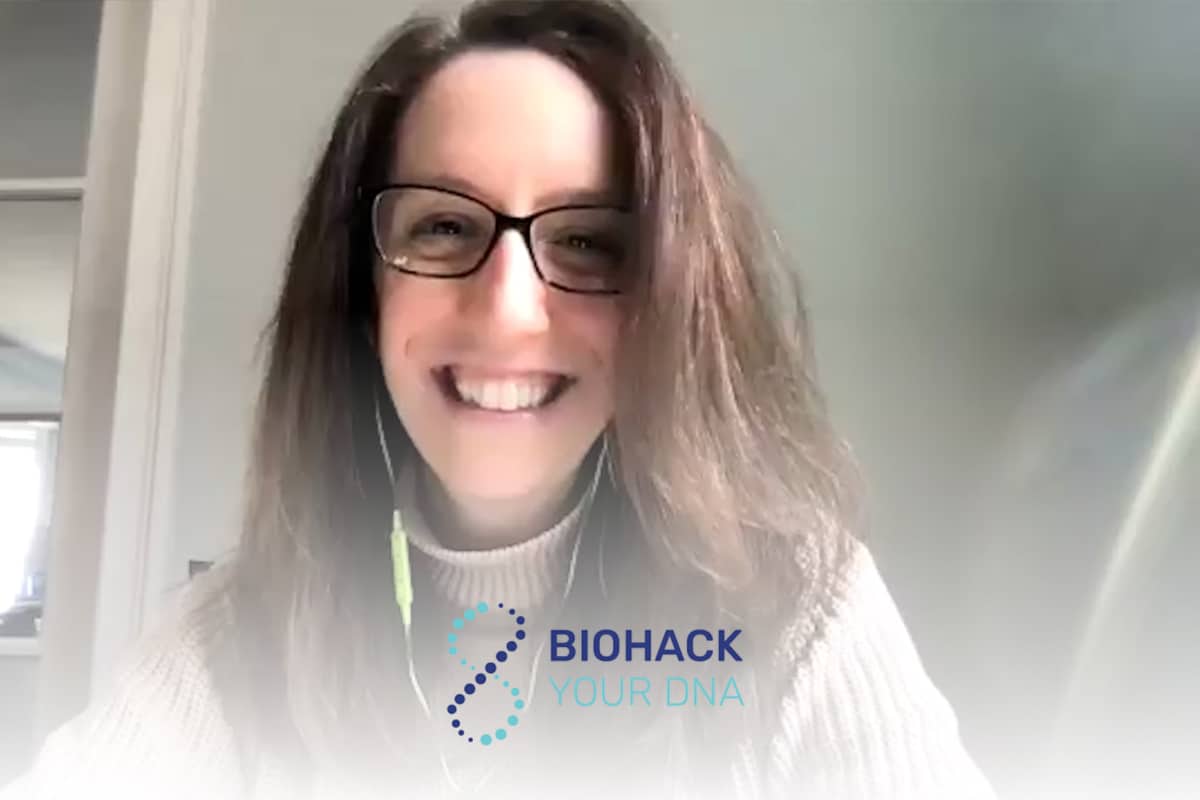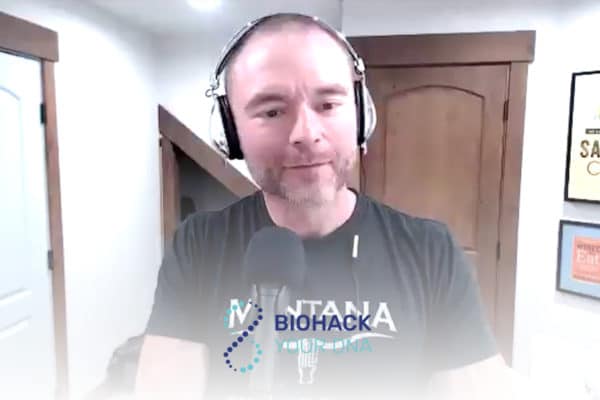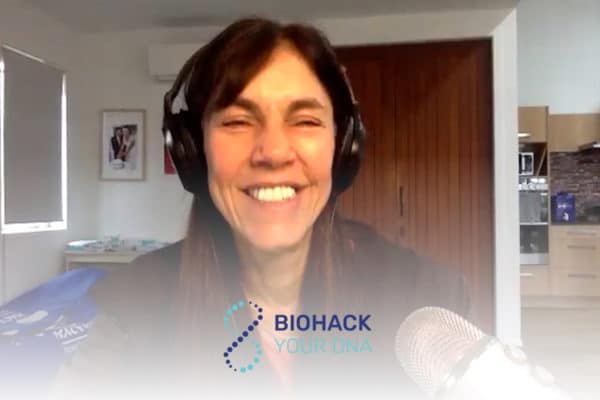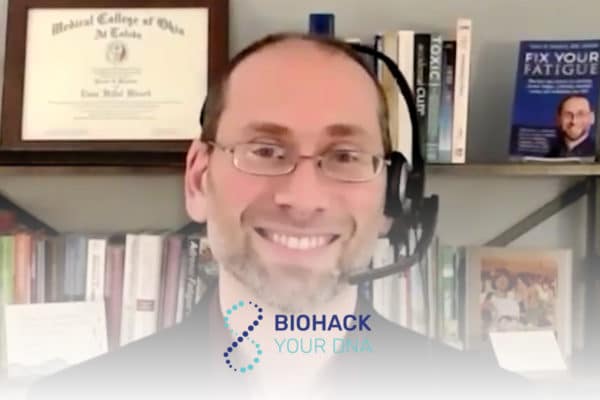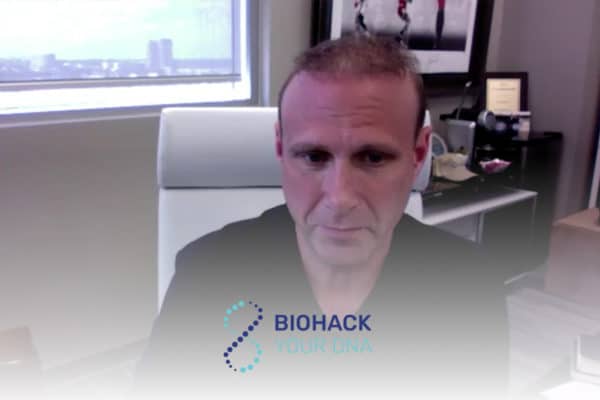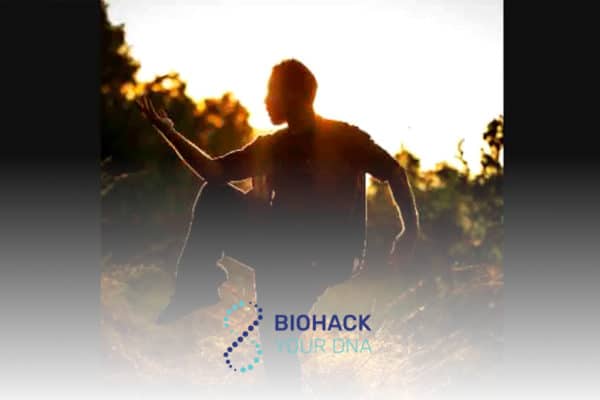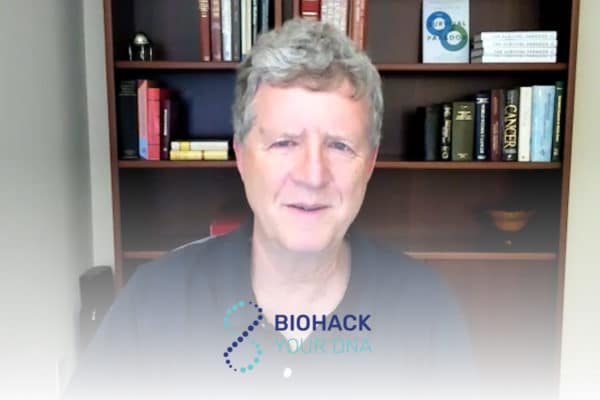Join the discussion below

Kashif Khan is the Chief Executive Officer and Founder of The DNA Company, where personalized medicine is being pioneered through unique insights into the human genome. With the largest study of its kind globally, The DNA Company has developed a functional approach to genomic interpretation overlaying environment, nutrition, and lifestyle... Read More
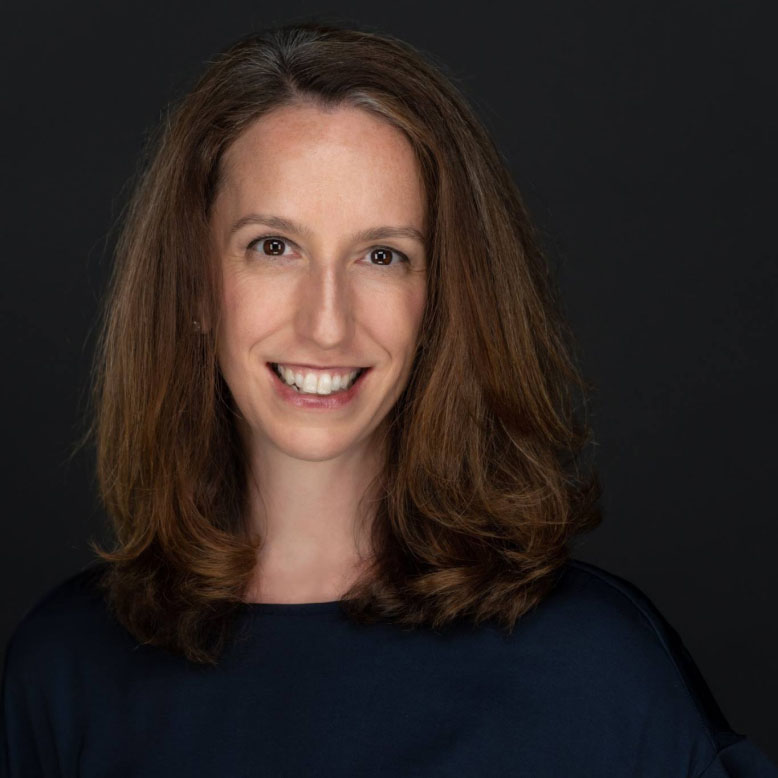
Jessica Drummond, DCN, CNS, PT, NBC-HWC
Dr. Jessica Drummond is the CEO of The Integrative Women’s Health Institute and author of Outsmart Endometriosis. She holds licenses in physical therapy and clinical nutrition and is a board certified health coach. She has 20 years of experience working with women with chronic pelvic pain, facilitates educational programs for... Read More
- Is Endometriosis a genetic disease
- What are the symptoms and why do some woman get misdiagnosed
- How to manage your epigenetics through nutrition and lifestyle
Related Topics
Autoimmune Disease, BioHacking, Digestive Issues, Endometriosis, Family History, Genetics, Hormonal Imbalance, Infertility, Inflammation, Pain, StressKashif Khan
So today, we’re gonna talk about something that is near and dear to us. You know, in some of the interviews you’ve been watching, you’ve heard us saying that, of all the problems we deal with, the areas that seem to need the most work are all in the female hormone space. Because that experience right now, when a woman goes to the doctor with fertility issues, with fibromyalgia, with endometriosis that we’re gonna talk about today, it’s kind of taken for granted, like, you’re supposed to have these problems, it’s your hormones. Right? And it’s this gray area of medicine, where the outcome is so underwhelming and so disappointing for most women. Meanwhile, there’s people like Jessica out there that are trailblazing and putting new research together and saying, no, there’s more to this than just, you’re supposed to have this problem and this is just out of the various options you had, here’s yours. Right?
Jessica Drummond, DCN, CNS, PT, NBC-HWC
That’s right.
Kashif Khan
You could actually be doing a lot more. And so, first of all, awesome to have you here today, Jessica.
Jessica Drummond, DCN, CNS, PT, NBC-HWC
Thanks so much for having me.
Kashif Khan
So we’re gonna dive into very specific area of female hormone issues, endometriosis, and we’re gonna look at it differently. Obviously we’ll dive into the general terms and, you know, how people see it and what they experience, but there’s so much more going on in terms of being able to truly help people and we’ll get into that with you. But, just for those that aren’t familiar, break it down. Like, what is endometriosis? What does it feel like? What are the symptoms? What does it do to you?
Jessica Drummond, DCN, CNS, PT, NBC-HWC
Yeah, so endometriosis is a disease process that’s about 50% genetic and it’s also inflammatory and likely autoimmune. I would say definitely autoimmune, but, I’m a little aggressive when it comes to looking at the literature. And the way it presents is, because there is this underlying genetic component, what endometriosis is, is the growth of tissue that is similar to, but not exactly the same, as the tissue that lines the inside of the uterus, also known as the endometrium. So, and this endometriosis lesion, tissues, endometriosis endometriomas, which are like tumors. It’s kind of like cancer, but it’s not cancerous. So, it doesn’t sort of, spread in the same way. But, it is an issue that those lesions of these endometriosis tissue can be inflammatory in and of themselves. They create inflammation. They also create their own hormone environment. So, it usually looks like this process of symptoms showing up sometime around prepuberty. Although it can be much later that people recognize they have the symptoms of endometriosis, and it’s still an average of 12 years before diagnosis.
Kashif Khan
Wow.
Jessica Drummond, DCN, CNS, PT, NBC-HWC
But if you look at like, who has it, 10% of all people with uteruses and when they did studies on female fetuses, 9% had endometriosis lesions already. So it’s kind of at birth, if you will. But then the symptoms will show up, normally around eight to 12, just around prepuberty, but it looks more like anxiety and stomach issues and maybe IBS, fatigue. Which is tricky, because of course, it could be any and all of those things too, but some of the red flags you wanna look for is, is there any family history of known endometriosis? Or lots of women in the family having really painful periods? You know, painful periods have become normalized in the family. That’s a red flag. It’s not normal, actually, to have pain at all with your menstrual cycles, beyond just very light cramping, maybe one day a month. You know, it should not be a part of someone’s lived experience to be at home once a month for more than, you know, at all, for a day for their period. But the problem is, in the ages of eight to 12, the cycle is not yet regular.
So, the symptoms look more like stomach aches or, you know, fatigue or there’s also dysautonomia associated with it. So like, passing out or kind of, vasovagal kinds of like, oh, I’m feeling hot or dizzy. And then people start to get used to the pain, the pain gets normalized and either they’ll be given one of two things by kind of a traditional gynecologist. Oh, it’s just normal. You know, people have some period pain and, you know, maybe if they’re twenties or thirties, hey, have a glass of wine before sex and just relax, you’ll be fine. Or, so sort of completely dismissed or they’re saying, okay, try some hormonal birth control, which, for about 10 to 30% of women, can be helpful to reduce the symptoms. So there is a valuable place for hormonal birth control, but it also masks the symptoms. So if someone’s given that for quality of life, without addressing the underlying issue of what’s going on from an immune standpoint, then, and hormonal standpoint, then the disease can progress and that can actually risk their fertility later on.
Kashif Khan
Mmm hmm. And then, I guess one of the challenges there is that all the stuff you’re describing, symptomatically and experientially, feels like the things you’re describing, meaning that I have anxiety, I have pain, I have that, and that that’s usually enough of an answer for somebody.
Jessica Drummond, DCN, CNS, PT, NBC-HWC
Right.
Kashif Khan
No need to dig further because it feels like pain, it smells like pain, it tastes like pain, it’s probably pain, right? I didn’t need something, right? Or whatever. And then it goes on. And you hear how many young women just kind of live with these things and think it’s a part of them. Right?
Jessica Drummond, DCN, CNS, PT, NBC-HWC
Yeah.
Kashif Khan
And that it’s just kinda meant to happen. So, where’s that point where you start to dig deeper and say that no, here’s like a big, is it just really at the beginning where you, everyone should be careful and say that any of the stuff you’re describing you might as well check? Or is there a certain type of-
Jessica Drummond, DCN, CNS, PT, NBC-HWC
Well, yes and no. It’s a little tricky, because the only way to truly diagnose endometriosis is via laparoscopic surgery. And so, not everyone immediately needs surgery. Now, there is some imaging that can be done. There are no really like, biomarkers yet, although there are some autoantibodies that show up more commonly with endometriosis. There are some genetic SNPs that tend to be more common with endometriosis. But even that’s a little tricky because, in that case, it’s like, people in Greece have different genetic SNPs than people in Sardinia. So like, which is still very close-
Kashif Khan
Yeah.
Jessica Drummond, DCN, CNS, PT, NBC-HWC
Mediterranean neighbors, right? So, we don’t have that elucidated so well yet. So there’s no quick blood test to say whether or not you have endometriosis.
Kashif Khan
Right.
Jessica Drummond, DCN, CNS, PT, NBC-HWC
It has to be surgically diagnosed. So first, the best thing to do is just assume that there is an underlying issue that is causing some of these things. So in my practice, my theme song, if you will, is don’t chase symptoms.
Kashif Khan
Right.
Jessica Drummond, DCN, CNS, PT, NBC-HWC
Optimize systems. So, let’s look at how’s the nervous system functioning. We start every single one of our endometriosis clients with a fitness tracker to track heart rate ability.
Kashif Khan
Mmm.
Jessica Drummond, DCN, CNS, PT, NBC-HWC
Are they living in fight or flight, which may be driven by a biochemical inflammation. It’s not necessarily an emotional stressor, although, often there are layers of these things.
Kashif Khan
Right.
Jessica Drummond, DCN, CNS, PT, NBC-HWC
But it could also be, you know, environmental toxins, chronic viruses, the endometriosis itself triggering inflammation. So we start by lowering stress. Then we can layer on things like looking at digestive function. So is someone mindfully eating, but then are they having regular bowel movements? How’s their intestinal lining? Are they absorbing nutrients? How are the inflammatory markers? So you can start with quote unquote, treating endometriosis, even if you don’t really know if that’s a hundred percent sure the issue. I think the big thing that raises my red flags, if you will, that we really wanna scope out endometriosis, is that familial component. So if there’s any family history or family lore of painful periods, of infertility, of, you know. If a girl or a mom kind of, finds herself on the floor in a middle school bathroom-
Kashif Khan
Yeah.
Jessica Drummond, DCN, CNS, PT, NBC-HWC
There is a big red flag for you. Like-
Kashif Khan
Yeah.
Jessica Drummond, DCN, CNS, PT, NBC-HWC
There’s a nonprofit organization called endowhat? that is starting to distribute training to school nurses. And I think, really, being in this field for more than 20 years, there’s a story, right? There’s, my aunt had infertility, my great aunt maybe had a early hysterectomy, Mom had painful periods, but she would just like, stay in her room for two days a month and take a lot of Tylenol and get through it, you know, or. There’s family history and then there is this, usually at some point, there’s some pretty intense pain, but if that’s not the case, ’cause it’s not always painful, sometimes it isn’t, there’s very often digestive issues that are sort of, unexplained and we see it usually as something like SIBO. Bloating is the key symptom.
Kashif Khan
Hmm. I know that you’ve done a lot of work in terms of research around genetics and trying to unpack that. And we’re gonna get into that because I think that’s really cool that you’ve been able do that. One question for you before that is, you mentioned that there’s this phenomenon of, sort of, localized hormone imbalance, meaning that because of where the issue is happening, that this belief that we have that hormones are hormones, right? Whatever’s going on up here is also going on up here and here and here. But you’re saying that because of this condition, you could have a zone in your body that’s operating differently, hormonally.
Jessica Drummond, DCN, CNS, PT, NBC-HWC
Yeah, kind of. In the sense that the, I mean, obviously we can’t take anything out of the body, right? It’ll all be sort of, circulating in some level. But it used to be thought that endometriosis was an estrogen-dominant condition.
Kashif Khan
Right.
Jessica Drummond, DCN, CNS, PT, NBC-HWC
If we just suppress the estrogen with drugs, basically, then this will get better. Now, symptomatically, that helps some of the time, you know, in the neighborhood of 10 to 30% of the time, and can be valuable because, you know, quality of life is important as people are navigating this recovery. But, there was a study published in 2018 in Belgium that showed us that that thinking was oversimplified.
Kashif Khan
Hmm.
Jessica Drummond, DCN, CNS, PT, NBC-HWC
On the endometriosis lesions themselves, the estrogen receptors can be upregulated, or, the progesterone receptors can be upregulated, so suppressing estrogen could actually be making things worse, or both or neither. And you could have these four different kinds of lesions in the same woman.
Kashif Khan
Oh my god.
Jessica Drummond, DCN, CNS, PT, NBC-HWC
And there’s no way to know that until after you do histology on the lesions postsurgery when it doesn’t matter, anymore. So, just going out, like, I always think of this recovery as kind of a shaky tower of blocks.
Kashif Khan
Mmm hmm.
Jessica Drummond, DCN, CNS, PT, NBC-HWC
Right? You can’t just plop testosterone or estrogen or progesterone at the very top of the shaky tower and expect it to like, stabilize the tower. You’ve got to look at, what’s their stress response? How often are they living in nervous system of fight or flight or freeze, versus rest, digest, heal? What’s their nutrient intake? Is it being absorbed? Are they able to process and metabolize foods and, you know, toxins and substances and have good bowel movements and lower inflammation and, you know, process toxins via the liver and kidneys.
Kashif Khan
Right.
Jessica Drummond, DCN, CNS, PT, NBC-HWC
All of those kinds of things are what stabilize the tower. Then, you might have an endometriosis lesion that’s like, kind of shaking the tower somewhere along the base. But, if everything else is pretty solid, you can have endometriosis excision surgery, done by a skilled surgeon, and then everything else can heal so much more beautifully. Also with physical therapy of the, you know, myofascia, you know, in that area you have a lot of muscles and ligaments and nerves and circulation. So if someone has been in pain for 12 years before anyone even took them seriously, that whole pelvis is gonna be kind of like-
Kashif Khan
Like, tense.
Jessica Drummond, DCN, CNS, PT, NBC-HWC
Tense.
Kashif Khan
Yeah.
Jessica Drummond, DCN, CNS, PT, NBC-HWC
So we have to do all of those things, not just pour hormones on the fire.
Kashif Khan
Right. So it’s kind of getting it from both fronts. Like, you gotta feel better. Here’s the symptoms that you’re complaining about, but there’s something underlying that, you know, let me deal with that also. And that’s kinda how you approach it and make them better. So genetically you’re saying that, this sort of concept of estrogen dominance, androgen dominance, is kind of where we start, but there’s, because there’s so much more knowledge when it comes to the genes, are there specific SNPs or genes or insertions, relations you look at that go beyond just hormone dominance?
Jessica Drummond, DCN, CNS, PT, NBC-HWC
Yeah, so one of the most interesting genes that we look at is the histamine-intolerance related genes, if you will. So DAO and HNMT, and HMNT that help us process histamines.
Kashif Khan
Mmm hmm.
Jessica Drummond, DCN, CNS, PT, NBC-HWC
A lot of people with endometriosis often have this swelling in their abdomen, which is called endo belly bloating, monthly. And a lot of it has to do with their, the slowing down of peristalsis in the intestines. So, histamine can often contribute to that, as can those endo, those localized lesions growing on the bowel, you know, being inflamed, connect, you know, there’s a lot of sticky lesions and adhesions wherever the lesions are. So there can be little parts of the digestive tracts that aren’t, you know, moving normally in normal peristalsis. Any inflammatory genes, any genes that are related to estrogen metabolism. So, you know, breaking down of estrogen and progesterone is important. So what I do instead of kind of just looking for any one gene, is we utilize a system called Opus23 that just takes kind of a larger picture of the system in a more of a networked way. So are there any sticky points where, when you’re thinking of the whole picture of estrogen metabolism, you know, methylation, COMT, things like that, is the body able to process hormones?
Kashif Khan
Hmm. So it’s that full hormone cascade from beginning to end, including, like you said, it’s kind of like, here’s your dominance, that’s just step one. Then here’s your, call it toxicity or metabolite level. Like, here’s what you actually make with it. And then here’s how well you clear that stuff. You know, it’s just sitting around or do you get rid of it? And then between these three combinations or combinations that can be made from these three, you can be a lot more precise in terms of why things are happening.
Jessica Drummond, DCN, CNS, PT, NBC-HWC
Yeah. And just, you know, things like, people will tend to need more nutrient support if they have more inflammation and they’re unable to clear it themselves. They may need more antioxidants, for example. You know, things like curcumin are really valuable for endometriosis, just because they’re so powerfully anti-inflammatory. So, I think we have to look at the layers of, the hormones is one piece of the puzzle, but the immune system is maybe even more important, and then even more important than that is the nervous system. So, looking at genes that we might originally think of as related to mental health, also have some physical health components. Like, is someone able to create and, you know, we talk about creating and processing and breaking down, not just the hormones, but also brain neurotransmitters.
Kashif Khan
Mmm hmm.
Jessica Drummond, DCN, CNS, PT, NBC-HWC
GABA, in particular, is a really common one. People that have anxiety that’s also created, co-presenting with like, muscle tension, we talked about in the pelvis, moreso than serotonin deficiency, although we see that too, but low GABA is, I would say one of the most common things that my patients with endometriosis struggle with. So that’s a lot why things like CBD can be so helpful. It actually helps to modulate, you know, GABA release. So, that’s why we really wanna take this like, full body approach and not think of this as just a, like a women’s reproductive disease.
Kashif Khan
So when you’re getting into, so it sounds like a lot of the intervention has to do with nutrition. And, when you’re doing that, are you look at nutrition in terms of, is this about genetic expression? Is it more about, you kind of know you’ve done enough of this where you know what’s needed and what’s going on, or is it more at an individual level? Here’s your genome, here’s where you’re not doing so well and here’s where we sort of need to turn the dials on the expression of your genes? Is it something like that?
Jessica Drummond, DCN, CNS, PT, NBC-HWC
Well, I would say with most patients, we don’t get that granular anymore. I don’t feel that it’s necessary to what we’re gonna do clinically, but I certainly can. You know, I mean I do work kind of privately, one on one with people as they need it. And so, so I think that if we think about this more like, globally, like what do most people need-
Kashif Khan
Right.
Jessica Drummond, DCN, CNS, PT, NBC-HWC
If I’m not gonna look at your genetics. By and large, the two key things that people need are really learning the process for how to shift their heart rate variability and be in that calm state, while they’re eating, and then eating in a way that’s pleasurable. Most people with endometriosis are so afraid of eating because they’ve had so much digestive and, you know, abdominal pelvic pain that they actually drift into eating disorder behavior. And so then we layer on kind of a functional medicine, aggressive elimination diet. Which, makes that worse. So instead, we wanna think about how can we start nourishing the system with delicious food? So I start really simply with bone broth or vegetarian broth-based soups that are high in vegetables that are cooked and blended, easy to digest, you know, slow-cooked proteins, animal proteins, sometimes plant proteins.
That depends a little bit on what they better tolerate. And just keeping the food at first, easy to digest and just full of those nutrients that turn on those supportive genes and the genes that help with detoxification. Things like rosemary, oregano, olive oil, some nuts and seeds like almonds, for example, for magnesium. So if we think about adding anti-inflammatory and easily digestible nutrition and in an environment where someone has activated their ventral vagus nerve and their parasympathetic so they’re in that calm, rest digest state, and they’re really enjoying the experience, the body can absorb better and it’s not so inflammatory. So, nutrition, but also kind of, that practice shifting into that calm state, getting comfortable with the varying discomforts that come along with these symptoms and not being so kind of, anxiety triggered by them, which will then sort of exacerbate the cycle again, right? So sometimes with each client, we have to see what kicks off the cycle? So one example is, I had a client who had endometriosis. She had higher stress scores on the days she had to commute to work versus work from home.
Kashif Khan
Mmm hmm.
Jessica Drummond, DCN, CNS, PT, NBC-HWC
So, that was step one that we noticed. Then it was worse on the days where she felt just a little bit of nausea first thing in the morning. That would kick off her kind of, pain cycle. Okay. So now we know this, so instead of powering through that nausea, which a lot of people who have had chronic pain for 12 to 15 years, are super good at powering through intense discomforts, right?
Kashif Khan
Right. Yeah.
Jessica Drummond, DCN, CNS, PT, NBC-HWC
Let’s slow it down a little and be like, oh, this nausea is my like, little red flag, my little yellow flag. Okay. Let’s step outside, let’s do a mindfulness practice, let’s have some chamomile tea, let’s slow my breathing. Let’s get the nervous system back down to a calm rest and digest level and, quiet the nausea, before I even eat breakfast and get dressed and head off to work. Then, that changes my entire day because I haven’t been trying to power through that stress and inflammation. And instead I’ve kind of gotten everything under control, had some nutrients that my body could absorb to help with supporting me that day, you know, change the environment in the car, listen to different music, feel more comfortable. And then, as we change each of those little patterns, so this isn’t about like, mega dosing of one nutrient supplement, it’s about like, over a period of six to 24 months, changing all of these little behavioral patterns that have developed for people to survive this illness, if you will, and kind of get through their day but have become maladaptive, changed them all in a way that makes the day less and less and less uncomfortable.
Kashif Khan
Hmm. So I mean, as I’m listening to you, it’s very clear in terms of, why does this problem happen and what to do about it? I think that when you take the average woman, who’s maybe, doesn’t even know that that’s what the problem is. She’s thinking about this pain and I have a gut problem, how do you take them from, you know, this very disease centric, sort of, isolated view of the problem to here’s all the stuff you need to do to get to this pinpointed, you know, I have pain here, but we gotta start with your diet and your stress and your brain and your, how do you stretch someone from this far down? Like, just get rid of my pain to, there’s a lot more going on.
Jessica Drummond, DCN, CNS, PT, NBC-HWC
Well, I have very slow conversations, so every time I meet with someone, I always meet with people for the first time for an hour.
Kashif Khan
Okay.
Jessica Drummond, DCN, CNS, PT, NBC-HWC
And we have a conversation. I’ve also written a book. “Outsmart Endometriosis” is my book. You can get it for free at outsmartendo.com and it really kind of walks through the step by step. But the first thing we do is we really listen to their unique story, because every circumstance of endometriosis, almost every case that I’ve ever encountered, because it’s so difficult to diagnose and it’s hardly taught at all in medical schools, has a lot of experiences of being dismissed of people thinking you’re malingering, you know, trying to get out of a test or whatever. And so, I think it’s really important that as practitioners that are trying to evolve how we deal with illness from a, I have an issue, I need the cure.
Kashif Khan
Yeah.
Jessica Drummond, DCN, CNS, PT, NBC-HWC
To, I have a vulnerability or a disease process going on or an injury. And I want to, over time, get more and more and more healed and functional. Because literally everyone does, right? Like, if you look at every human right now, each of us has some vulnerability.
Kashif Khan
Mmm hmm.
Jessica Drummond, DCN, CNS, PT, NBC-HWC
We probably have some environmental toxin load. We might have some symptoms, some days, right? It’s just, that’s part of being a human.
Kashif Khan
Mmm hmm.
Jessica Drummond, DCN, CNS, PT, NBC-HWC
And so if we think about, let’s change this conversation from how do I fix this? Or how will you fix this, ’cause I don’t really have the power to fix anything. I’m not really a mechanic, right?
Kashif Khan
Yeah.
Jessica Drummond, DCN, CNS, PT, NBC-HWC
To how do we like, first we have to really acknowledge and listen to people’s stories of their experience and not dismiss those. And then, we show them the path. Look, this, you can live healthier. You can feel better most days, you can have symptom resolution, almost all of the time. You may still have some abhorrent endometrial tissue. All the surgeons say occasionally it can come back or it can move or, you know, it can proliferate again. But if you don’t, if you don’t think of it that way, if you think of it as, let me get healthier and healthier and healthier and healthier-
Kashif Khan
Mmm.
Jessica Drummond, DCN, CNS, PT, NBC-HWC
In the body in which I currently have, and I’m willing to commit at least six months to a year or two to do that, my life can be completely changed from really restricted to defining what I define as health. Which might, for them, like I have a client who thought she could only ever be a freelance writer. She could not go get a job at like, a magazine or a newspaper or something because the requirements would that be that she would have to be there, right?
Kashif Khan
Right.
Jessica Drummond, DCN, CNS, PT, NBC-HWC
And she was like, “Oh, you mean, I don’t have to restrict my career to just this?” Nope.
Kashif Khan
Right.
Jessica Drummond, DCN, CNS, PT, NBC-HWC
You don’t have to do that.
Kashif Khan
Yep.
Jessica Drummond, DCN, CNS, PT, NBC-HWC
You know? You can be a lawyer, you can be a journalist, you can do whatever you want, but we have to understand how to put that into context. Does that make sense?
Kashif Khan
Yeah. In that healing journey, because the way you’re approaching things are unique, you’re truly supporting the system then healing the body in full, not just, you know, masking this symptom, experientially, is it kind of like this gradual decline of pain points or is it kinda like, you gotta pass this threshold and then a switch turns off and people just feel better?
Jessica Drummond, DCN, CNS, PT, NBC-HWC
That’s an interesting question. I think a little of both. I think the digestive issues can be a point where, it just starts to function better-
Kashif Khan
Sure.
Jessica Drummond, DCN, CNS, PT, NBC-HWC
And they just stop having so much bloating and stuff like that. I think the pain, same thing. I think we can get to a level where pain is not a normal part of their day. There can be pain flares usually related to like, something changing like, oh, I went home for a holiday dinner and ate totally different things and was under a different stress and drank alcohol and then I had a flare, but-
Kashif Khan
Right.
Jessica Drummond, DCN, CNS, PT, NBC-HWC
Even that would be maybe, shorter lasting, if you will. So I think it’s a combination of both. I think there’s some gradual decline, but there’s also, over time, having just less and less experiences of flare days or bad days.
Kashif Khan
Yeah, in general, I guess you’re bringing their inflammatory load down so they’re not sitting at that tipping point anymore, ready to, for something to trigger. You mentioned chemicals and sort of, hormone disrupters. We know that that’s a major problem, like, a hugely impactful problem. How much is it in people’s awareness when you start to talk to them about like, endocrine disruptors and what’s going on in their frying pans and in their water, and are they even aware? And how do you sort of, implement when sort of, everything around you could potentially be a problem?
Jessica Drummond, DCN, CNS, PT, NBC-HWC
Yeah, so that’s why we start with the nervous system. Because I think that we have a saying in my clinic called death by functional medicine. I am, you know, could be a living example of that. So, I have long COVID and I’ve been recovering from that for the past year or so. And I can see how having this experience of chronic illness, how it can be very tempting to still look for the thing, right?
Kashif Khan
Right.
Jessica Drummond, DCN, CNS, PT, NBC-HWC
There are hundreds of lab tests you can do. I’m gonna be exposed to stuff like, so I did a number of toxin lab tests on myself, with a practitioner, another colleague of mine who’s great. And, you know, sensitive to this and this environmental toxin built up, and one of the things he said to me was, “Oh, do you ever drive your car with your windows down?” ‘Cause one of the things had to do with like, car exhaust.
Kashif Khan
Hmm.
Jessica Drummond, DCN, CNS, PT, NBC-HWC
And I was like, “Of course. I’m 48 years old.” “I’ve had, you know, at some point in my life I’ve driven a car with the windows down.” And, you know, you cannot be afraid of living on the planet, because that then triggers this issue where your heart rate-
Kashif Khan
Right.
Jessica Drummond, DCN, CNS, PT, NBC-HWC
You know, your stress, your heart rate variability is off all the time. Because, there is really no way to, there’s no like, pristine place on planet earth. All of our water is polluted, all of our air is polluted, we are exposed to mold, we are exposed to stuff, right? We are exposed to viruses. I mean, we are living in a world where, if you go to the grocery store today, with or without a mask on, you could get COVID, right? It’s just the truth. You could be exposed to it, anyway. I live in Connecticut. I could be exposed to lime. I may have been exposed to lime at some point in my life. I don’t know, I’m not aware of it necessarily, but. So, I think it’s really important that we accept that there will be some level of body burden.
Kashif Khan
Right.
Jessica Drummond, DCN, CNS, PT, NBC-HWC
And not start, and not, even, I think, testing for it can be helpful in some cases to maybe guide exactly how to reduce that body burden. ‘Cause obviously there are different ways to do that, depending on what the body burden is primarily consisting of. But I also think we have to just think of it as that. A body burden-
Kashif Khan
Mmm hmm.
Jessica Drummond, DCN, CNS, PT, NBC-HWC
That we want to reduce. That we cannot get to zero. Because people with endometriosis, and I think a lot of autoimmune diseases, have an underlying Type A personality, right?
Kashif Khan
Yeah.
Jessica Drummond, DCN, CNS, PT, NBC-HWC
And so, it’s almost a competition of like, how I wanna get my immune markers perfectly and my mold toxicity to zero and my, never have any, whatever, car exhaust exposure, right? This is impossible. So instead of chasing that, which I think is just as bad as chasing a cure like, this doctor to do this, what medicine, what pharmaceutical, we have to think of this as, all of those things put pressure on our systems that help us create healthy hormones.
Kashif Khan
Mmm hmm.
Jessica Drummond, DCN, CNS, PT, NBC-HWC
So, we know that plastics, for example, is a really big one. So what are like, the big needle movers? Plastics. Let’s lower the load. Drinking water. Let’s use a filter. Like, let’s start layering on the de-stressors, or toxin lowerers, in the same way that we used to layer on the stressors. Does that make sense?
Kashif Khan
That makes a lot of sense, yeah. You sorta slowly unpeel that onion until you get to this nice core that was protect us. In the middle, hopefully, if you can find it. And it’s funny how you talk about rooted behavior, because we’ve noticed the same thing where, in order for someone to be of the mindsets where they’re gonna find you. Right? Where it’s not, I’m a victim of this disease, I go to the doctor and I take a pill and that’s just who I am, versus, I wanna get rid of this thing and I think I can.
Jessica Drummond, DCN, CNS, PT, NBC-HWC
Yeah.
Kashif Khan
And it requires certain neural wiring, certain genetics that drive those neurochemicals. And then you end up with this sort of, kind of high-functioning anxiety, you know, of like, I gotta get it done, I gotta get it done. I gotta get it done. And that every little thing matters and that sense of reward. And so, you often can create, like you said, death by functional medicine, you know, where there’s a burnout because you’re trying to do too much. Which then affects compliance, ’cause all of a sudden it’s not possible, right? And you try and bring that into the world you have to live in with your kids and your family and your everything. So, it’s even just that awareness of understanding the fact that I’m either talking to you or I’m even reading a book or listening to a podcast, I’m already doing so much more. And it took a certain personality to get me there. And so, just be aware, of, you know, how I handle the world around me and kind of tone things down. And it comes down to, you know, so BJ Fogg wrote the book, “Tiny Habits,” right?
Jessica Drummond, DCN, CNS, PT, NBC-HWC
Hmm.
Kashif Khan
And if you can just break it down to small stuff that you can implement. Don’t try and, like they said, boil the ocean. Like, what are these two or three things I can do this week? And then how do I scale those things and carry them into work and carry them into my family and slowly get towards a changed identity? Right? And that’s key, I think, is to do it slowly in tiny habits.
Jessica Drummond, DCN, CNS, PT, NBC-HWC
Yeah.
Kashif Khan
Do you find, that as you’re working with people, that there’s ever a sense of loss of hope, you know, or like, this isn’t working, or do people generally find success when they start to get down the right path?
Jessica Drummond, DCN, CNS, PT, NBC-HWC
Yeah, I really feel like they do. We very rarely have people just sort of, give up. Now what we do see sometimes, is people get to a point where they realize that their trauma is blocking their progress.
Kashif Khan
Hmm.
Jessica Drummond, DCN, CNS, PT, NBC-HWC
And, you know, people with endometriosis and pelvic pain in general, have very high rates of, history of sexual abuse and sexual assault. I mean, 80% of female physical therapists have been sexually assaulted at work. Or, assaulted at work. And so, it’s super common to be female and have had some kind of trauma. You layer on women’s health disease, if you will, that likelihood it amplifies, ’cause you probably also then had medical trauma and medical gas lighting. So, sometimes, when we, as we’re unpeeling the layers, that piece of it has to be dealt with before we can move through it. And, we do that concurrently in a way, like, where it’s a very trauma-informed coaching, nutrition recommendations and physical therapy recommendations. But sometimes we do need more direct trauma resources.
So things like EMDR, mental health therapy is a good option, or things like that. So I think that’s key. I think the other thing that can frustrate people is just, if I don’t sort of, set it up well and really explain it at the beginning, this whole process that we talked about a minute ago, you know, it’s gonna be months to years of small habits. You know, “Atomic Habits,” by James Clear is very similar, what you’re talking about. Like, the little tiny habits, day-to-day habits. It’s not really, I’m never gonna give you like, one supplement that suddenly is going to like, relieve all your symptoms. So, we have to really think about how you’re living and practice boundary work and practice rest and prioritizing rest. And again, your personality that you brought me here, as you said-
Kashif Khan
Yeah.
Jessica Drummond, DCN, CNS, PT, NBC-HWC
Might be part of the problem. And hey, like, I certainly get that.
Kashif Khan
Yeah.
Jessica Drummond, DCN, CNS, PT, NBC-HWC
You know, I’m a working mom, I run a business. Like, I feel you and, we have to see that about ourselves and start to unwind it. But, I say to my clients all the time, look, probably a hundred percent of my clients would get a hundred percent better if, for three months, and maybe one skilled, really good endo surgeon if needed, or six months. We could go to like, an island and someone was watching our kids, and like, feeding us all the food that we’re supposed to eat, and we were doing meditation and breathwork and yoga every day and just sitting outside, like everyone would heal.
Kashif Khan
Right.
Jessica Drummond, DCN, CNS, PT, NBC-HWC
But then, you would go home and you’d have the same problem.
Kashif Khan
Yeah.
Jessica Drummond, DCN, CNS, PT, NBC-HWC
So, we have to learn how to do this in our lives. And that’s where occasionally, people bump up against a thing. It’s not usually that they can’t, or it doesn’t work, it’s that they either aren’t resourced to do it, you know, financially they don’t have the support or they don’t have the family support or there’s trauma mixed in with financial support that they’re receiving. Or, you know, it comes down to sort of, life and relationship issues that make it difficult to implement a healthy lifestyle plan in a capitalist, productive world.
Kashif Khan
Right. Yeah.
Jessica Drummond, DCN, CNS, PT, NBC-HWC
And, that’s where we have challenges. But, you know, people are resourceful and very often we can work through that.
Kashif Khan
Yeah, we see the same where, so it’s kind of like these three pillars. So like, you have your genetics in the middle and then there’s environment, nutrition, lifestyle. Here’s these three prongs that can pull you in different directions. In the environment piece, nutrition you can understand, you know, food, supplements, water. Lifestyle you kinda get. Exercise, you know, what do I do with my family also? But this environment piece, often people don’t realize how much more there is to within, just literally like, chemical, environment or toxic, it’s where I work. And the people, the shift, the mental shift. It’s how I am with my kids, it’s where I am with my kids. Right? When I move to say, Grandma’s house for Christmas break, the changes that happen, you know? So that, controlling your environment, extends beyond yourself. If the people around you aren’t participating in your, kinda healing, and understanding what you need, very hard to deal with the environmental fact. The simple thing of like, Christmas break. We’re going, you know, the family’s getting together. You’re not gonna control what you eat for that 10 days. It’s very difficult. Unless, you’ve had that open discussion with everybody and say, this is part of my therapy and I need you to support it and be part of it. And maybe you can eat a little differently with me too, for a week. It’s not gonna be bad for you. It’s anti inflammatory.
Jessica Drummond, DCN, CNS, PT, NBC-HWC
Right.
Kashif Khan
Right?
Jessica Drummond, DCN, CNS, PT, NBC-HWC
Right, yeah.
Kashif Khan
So, in that environmental shift that, you know, is kind of outta people’s controls, it can be, they just don’t think of it. We’re not, there’s no cognition around, you know, this type of thing. You just think, I have to do that. It’s family, it’s friends, it’s work. No, you can actually manage this stuff if you push a little harder. So, in the work that people do with you, how are they finding you? Like, where does it, all the women that are out there suffering, the lucky ones that actually, you know, found you and ended up working with you, how does this happen? Is it like a clinic or, what does it look like?
Jessica Drummond, DCN, CNS, PT, NBC-HWC
Yeah, we have a virtual health-coaching practice where I work one on one with people, but we also have a group program that enrolls periodically. They’re sent to me by their physical therapists, their surgeons, I speak at a lot of conferences, I’ve published a book and hundreds of interviews and videos and stuff like that. So it’s it’s through searching and networking, primarily.
Kashif Khan
Right. And then experientially, it’s kind of like, you’re not here to put a bandaid on it. You’re gonna put them through several months of coaching to heal, truly heal.
Jessica Drummond, DCN, CNS, PT, NBC-HWC
Yes, for sure. We, a minimum of six months.
Kashif Khan
Right. And I’m guessing in that journey, there’s probably other things, other spokes of this central hub of a problem that kinda go away, that people weren’t even anticipating. ‘Cause if you’re dealing with system support, then all these other, whether it’s eczema or migraines or whatever, I’m sure you have experience with all these other things kind of dropping off.
Jessica Drummond, DCN, CNS, PT, NBC-HWC
Yes, absolutely. Headaches, commonly, sleep issues. Anxiety is a big one. Fatigue. Absolutely. Because as you said, the root issue was the same.
Kashif Khan
Okay.
Jessica Drummond, DCN, CNS, PT, NBC-HWC
Just showing up in a multiple different ways, symptomatically.
Kashif Khan
And how much overlap is there with other female hormone conditions? Like, the big common ones?
Jessica Drummond, DCN, CNS, PT, NBC-HWC
Well, we do see overlap with PCOS. So if people have period issues and they have pelvic pain and sexual pain, it’s very likely that they don’t just have PCOS. They’re much more likely to also have endometriosis if they have pain.
Kashif Khan
Right.
Jessica Drummond, DCN, CNS, PT, NBC-HWC
Infertility, absolutely. It’s one of the number one causes of infertility. Any menstrual health issues are, you know, are very- Irregular cycles, long cycles, heavy. Because it’s that endo is cured by hysterectomy, which it’s not. Actually, hysterectomy doesn’t do anything for endometriosis because, by definition, endometriosis is outside of the uterus. But, adenomyosis, which is similar to endometriosis, but inside the kind of, muscle of the uterus, often people will have endometriosis and they can also have adenomyosis, that, in that case, hysterectomy is occasionally, or not even occasionally, that could be a reasonable treatment option. What else? PCOS. PMS, you know, so any mood symptoms related to endo, related to menstrual cycles can be related to endo. Oh, and the other mythology is that menopause cures endo. But again, endo is not really a hormonally-driven disease. So menopause does not cure endo.
Kashif Khan
Right.
Jessica Drummond, DCN, CNS, PT, NBC-HWC
And, so, that is another myth that, you know, we often have to unwind and then it, you know, it’s challenging, it can be challenging, to support people through perimenopause and menopause because the hormone replacement therapy conversation has to make sure that that whole tower of blocks, is as stable as possible before someone even goes down that route.
Kashif Khan
Right. And one more thought, just ’cause you’ve brought it up a couple times, but, I think most people that are in it know that there’s this risk around infertility issues. Right?
Jessica Drummond, DCN, CNS, PT, NBC-HWC
Yeah. Mmm hmm.
Kashif Khan
So, is this like, the damage has been done? Or is it more like, if you heal the endo, you’re also creating a better environment for fertility? Or is it kinda like you’ve caused yourself a problem?
Jessica Drummond, DCN, CNS, PT, NBC-HWC
Oh, no, no, no, absolutely. The earlier endo is spotted and dealt with, sort of holistically, you’re gonna lower your, kind of optimize and maintain your fertility. Also, early appropriate endometriosis excision surgery with a skilled physician is key. I have clients who, we can completely eliminate their symptoms with everything we do. Nutrition, supplements, lifestyle, medicine, all of that. But, I still have them consult with an endometriosis excision specialist because, without symptoms, the disease could still progress and that may impact their later fertility. So especially if fertility is a goal for them and they’re quite young.
Kashif Khan
Right.
Jessica Drummond, DCN, CNS, PT, NBC-HWC
I want them to start that relationship with a surgeon. It may not ever be appropriate for them to have surgery, but I want them to at least understand that relationship with their fertility to optimize the preserving of that fertility, as long as they want it.
Kashif Khan
I’m guessing that this sort of fertility stage is a common, is where people uncover their endometriosis, like this thing that they didn’t realize was going on.
Jessica Drummond, DCN, CNS, PT, NBC-HWC
Yeah.
Kashif Khan
So what is the common response from that? Whether it’s your primary care or fertility specialist, like, are they giving people the right advice?
Jessica Drummond, DCN, CNS, PT, NBC-HWC
Generally? No. Absolutely not. They’re, you know, they’re using pharmaceuticals. Now. Sometimes this is when surgery is done by someone, maybe, who doesn’t have the skill. That this isn’t their full-time life, right? They’re not really doing endometriosis surgery as a full-time thing. They might, you know, ’cause you can, there are sort of like, okay endometriosis surgeries where they can just sort of, burn it off. You know, there’s sort of like, that perspective of go in, sort of cleaning it up for the sake of the fertility. It’s a really bad idea because you’re not really looking at the extent of the disease, the person may end up having to have another surgery anyway, there’s complications from that surgery, there either can be adhesions. So who does your endometriosis surgery? And the fact that they’re really understanding of the whole process of endometriosis, that this is really one of their specialties, makes a big difference to the outcomes. I’ve been working with patients with endometriosis for over 20 years. And in the first half, you know, or so of my practice, it was very common to see patients with 16 surgeries-
Kashif Khan
Wow.
Jessica Drummond, DCN, CNS, PT, NBC-HWC
A surgery every year, you know, that people would just go in and like, burn stuff off and it would grow back or spread. They had no good tools. It was surgery and opioids, you know. Or Lupron, which is a medication that puts you into chemical menopause. I can’t tell you how many of my clients call it like, the Lupron years. Like, I was a teenager, I was, I had a huge mental health challenges, I felt terrible all the time. Like, it’s just not normal to put a 16 to 28-year-old, like, into menopause, with no plan, or go in once a year and just burn stuff off. Like, that is just malpractice. And so, and then I’d see people with like, stimulators, tons of opioid addiction. So, if endometriosis is uncovered as a key contributor to someone’s infertility, take that information and find a skilled excision surgeon. There are a few listed in my book as places to start, you know, have a conversation with me and we can talk about people that are in your area. They are more and more available, you know, there’s more and more training available, but it’s not a simple subspecialty. You wanna choose your endometriosis surgeon exactly in the same way as you would choose a cancer surgeon. They should be really good.
Kashif Khan
Yeah. And the options are there and it’s, you know, people often don’t realize that that choice can even be made.
Jessica Drummond, DCN, CNS, PT, NBC-HWC
Yeah.
Kashif Khan
You know, it’s just, well, they told me they’re a surgeon, I figured they know what they’re doing. You know? So, meanwhile, there’s experience to everything, especially when you’re dealing with something that specialized and focused, that doesn’t happen that often, in, for the most part. So, yeah. Great advice for some people to just sort of shop that around a little bit. But you’ve made it easy because you put it in the book, so people can just look it up. So, before we go away, this is fascinating. We could keep going all day. What are sort of, someone just getting started, someone that’s just hearing this for the first time that, oh, there’s another way. What are the sort of top two or three things that they should do like, today? Like, let’s just get started and here’s the top habits for you.
Jessica Drummond, DCN, CNS, PT, NBC-HWC
Yeah. I think first tiny habit, if you will, would be to start to notice any like, triggers that kick off your pain flare cycles or your digestive cycles. And stop looking at food. Look at, like, sleep, stressors. Start with sleep and stressors because we get over sensitized to food and we don’t pay attention as much to our environmental stressors. And then second, would be just, if you can take one of those toxin stressors off the body burden, you know, one of the simplest is plastic. I had a client at one time in the Middle East who had, she was wearing plastic flip flops. Like, ’cause she had gotten rid of the water bottles and a lot of other, you know, storing her food in plastic. We realized in the heat, she was wearing plastic flip flops every day.
Kashif Khan
Mmm.
Jessica Drummond, DCN, CNS, PT, NBC-HWC
So, less plastic exposure directly to your body. And the most common ones are drinking out of plastic water bottles or drinking like, coffee out of a plastic-topped cup, or storing your food in plastic. So, lower, start, just little, gently lowering the body burden and start to bring awareness to some of the stressors that may be triggering your pain cycles.
Kashif Khan
Cool. That’s awesome advice and so easy to do. You know, you just have to be sort of aware and then start. So, this was amazing. If people wanna work with you, where do they find you?
Jessica Drummond, DCN, CNS, PT, NBC-HWC
The best place to go is outsmartendo.com. They can also download a free copy of the book there and schedule a strategy session directly with me if we wanna discuss their particular case. Also, you can follow us on Instagram, @outsmartendo or @integrativewomenshealth.
Kashif Khan
Amazing. This was enlightening. I’m sure anyone that needed answers got them. I would urge anyone that’s, you know, having issues to go ahead and reach out and work with you. Thank you again. This was great.
Downloads
